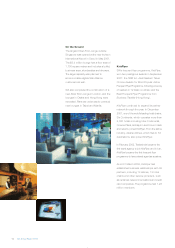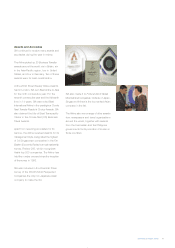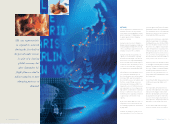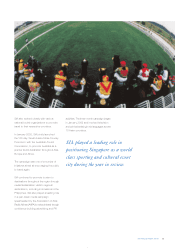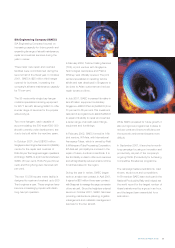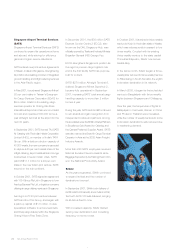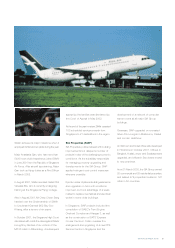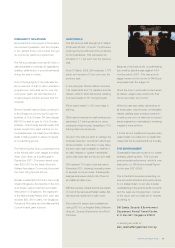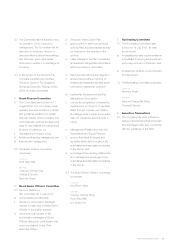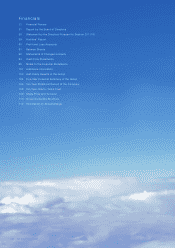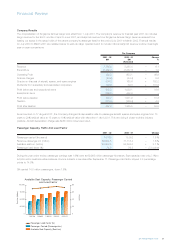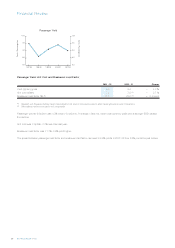Singapore Airlines 2002 Annual Report Download - page 26
Download and view the complete annual report
Please find page 26 of the 2002 Singapore Airlines annual report below. You can navigate through the pages in the report by either clicking on the pages listed below, or by using the keyword search tool below to find specific information within the annual report.
Singapore Airport Terminal Services
(SATS)
Singapore Airport Terminal Services (SATS)
continued to expand its operations at home
and abroad, while striving for efficiency
gains and higher service standards.
SATS entered new joint venture agreements
in Taiwan, India and Singapore, strengthening
its position as a leading provider of integrated
ground handling and inflight catering services
in the Asia-Pacific region.
In May 2001, it purchased Singapore Airlines’
20 per cent stake in Taiwan’s Evergreen
Air Cargo Services Corporation (EGAC) for
$8.8 million. EGAC is the leading cargo
services operator at Chiang Kai-Shek
International Airport and has won a contract
to build and operate a 500,000 tonne-a-
year airfreight terminal at the airport for the
next 30 years.
In September 2001, SATS formed TAJ SATS
Air Catering with The Indian Hotels Corporation
Limited (IHCL), a member of India’s TATA
Group. With a daily production capacity of
40,000 meals, the new company is expected
to capture a 55 per cent market share of the
inflight catering, airport restaurant and lounge
businesses in seven Indian cities. SATS
paid US$17.7 million for a 49 per cent
stake in the new Indian joint venture, SATS’
second on the sub-continent.
In October 2001, SATS signed an agreement
with YCH Group Pte Ltd in Singapore to form
Aerolog Express Pte Ltd, a logistics company
offering air cargo delivery services in Singapore.
Aerolog is a 70:30 joint venture between
SATS and the YCH Group, and began with
a paid-up capital of $1.8 million. It uses
specialized software to ensure seamless
and timely cargo delivery within the Singapore
Changi Airport Free Trade Zone.
In December 2001, the $30 million SATS
Express Courier Centre 2 (ECC2), also
known as the DHL Singapore Hub, was
officially opened by Trade and Industry Minister
Brigadier-General (NS) George Yeo.
ECC2 strengthens Singapore’s position as
the region’s premier cargo logistics hub
and is the first facility SATS has purpose-
built for a client.
SATS’ $270 million Airfreight Terminal 6,
dubbed Singapore Airlines Superhub 2,
became fully operational in September
2001, increasing SATS’ total annual cargo
handling capacity to more than 2 million
tonnes a year.
During the year, SATS and its staff continued
to win awards and gain recognition from
independent bodies and partners. Among
the accolades were the British Airways Partners
in Excellence Gold Award for Catering and
the Qantas Preferred Supplier Award. SATS
was also named the Best Air Cargo Terminal
Operator in Asia at the 2002 Asian Freight
Industry Awards.
More than 230 SATS employees received
National Excellent Service Awards while
Baggage Supervisor (Line Training) Kevin Chin
won the National Productivity Award.
SilkAir
As the year progressed, SilkAir continued
to expand its fleet and the number of
destinations it served.
In September 2001, SilkAir took delivery of
its fifth A320-200 aircraft, and in March 2002,
the fourth A319-100 was delivered, bringing
its all-Airbus fleet to nine.
With increased capacity, SilkAir started
serving new destinations and increasing
frequency on some routes.
In October 2001, it launched a twice-weekly
service to Kochi in the Indian state of Kerala,
which was subsequently increased to four
times weekly. Coupled with its existing
thrice-weekly service to the state capital
Thiruvananthapuram, SilkAir now serves
Kerala daily.
In the same month, SilkAir began a thrice-
weekly (later reduced to twice-weekly) service
to Palembang in South Sumatra, the eighth
Indonesian destination in its network.
In March 2002, it began its first scheduled
service to Bangladesh with thrice-weekly
flights between Singapore and Chittagong.
Over the year, the frequencies of flights to
Balikpapan in Indonesia, Xiamen in China
and Phuket in Thailand were increased,
while the number of weekly services to some
Indonesian destinations was reduced due
to weakening demand.
26 SIA Annual Report 01/02



